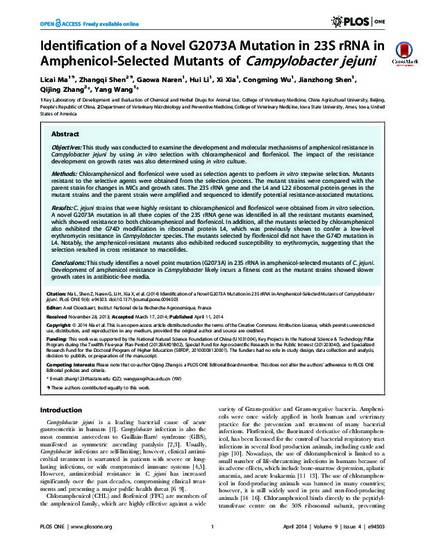
Article
Identification of a Novel G2073A Mutation in 23S rRNA in Amphenicol-Selected Mutants of Campylobacter jejuni
PLoS ONE
Document Type
Article
Disciplines
Publication Version
Published Version
Publication Date
4-11-2014
DOI
10.1371/journal.pone.0094503
Abstract
Objectives
This study was conducted to examine the development and molecular mechanisms of amphenicol resistance in Campylobacter jejuni by using in vitro selection with chloramphenicol and florfenicol. The impact of the resistance development on growth rates was also determined using in vitro culture.
Methods
Chloramphenicol and florfenicol were used as selection agents to perform in vitro stepwise selection. Mutants resistant to the selective agents were obtained from the selection process. The mutant strains were compared with the parent strain for changes in MICs and growth rates. The 23S rRNA gene and the L4 and L22 ribosomal protein genes in the mutant strains and the parent strain were amplified and sequenced to identify potential resistance-associated mutations.
Results
C. jejuni strains that were highly resistant to chloramphenicol and florfenicol were obtained from in vitro selection. A novel G2073A mutation in all three copies of the 23S rRNA gene was identified in all the resistant mutants examined, which showed resistance to both chloramphenicol and florfenicol. In addition, all the mutants selected by chloramphenicol also exhibited the G74D modification in ribosomal protein L4, which was previously shown to confer a low-level erythromycin resistance in Campylobacter species. The mutants selected by florfenicol did not have the G74D mutation in L4. Notably, the amphenicol-resistant mutants also exhibited reduced susceptibility to erythromycin, suggesting that the selection resulted in cross resistance to macrolides.
Conclusions
This study identifies a novel point mutation (G2073A) in 23S rRNA in amphenicol-selected mutants of C. jejuni. Development of amphenicol resistance in Campylobacter likely incurs a fitness cost as the mutant strains showed slower growth rates in antibiotic-free media.
Rights
This is an open-access article distributed under the terms of the Creative Commons Attribution License, which permits unrestricted use, distribution, and reproduction in any medium, provided the original author and source are credited.
Copyright Owner
Ma et al
Copyright Date
2014
Language
en
File Format
application/pdf
Citation Information
Licai Ma, Zhangqi Shen, Gaowa Naren, Hui Li, et al.. "Identification of a Novel G2073A Mutation in 23S rRNA in Amphenicol-Selected Mutants of Campylobacter jejuni" PLoS ONE Vol. 9 Iss. 4 (2014) p. e94503 Available at: http://works.bepress.com/qijing-zhang/2/

This article is from PLoS ONE 9 (2014): e94503, doi:10.1371/journal.pone.0094503. Posted with permission.